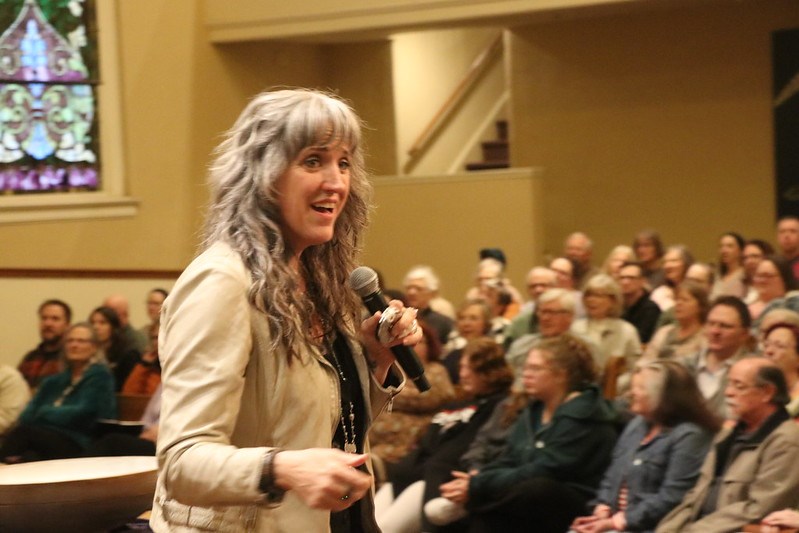Not long ago, my wife Jeanne and I were at Fountain Street Church in Grand Rapids, Michigan to for an appearance by Nadia Bolz-Webber.

Bolz-Webber, who burst on the “progressive Christian” scene with her book, Pastrix, is on a national tour she calls her Red State Revival. In events held around the country, largely in churches, she hopes to shore up the faith of Christians in mostly Red states who are shaken by the rise of the idolatry of Christian Nationalism and wondering how to live out their faith in this new reality.
I decided to attend because I’m a regular reader of Nadia’s Substack “The Corner.” I have come to appreciate her deeply personal, heartfelt, and solidly Christian comments on life, faith, and what’s happening in our country today.
Grand Rapids certainly fits the target of her tour. Michigan turned red in the last election, while Grand Rapids, a heavily churched city and home of both the Christian Reformed Church and the Reformed Church in America, voted solidly Democratic in the last election.

Interestingly, Nadia remarked that this was the largest rally so far on her tour. We nearly filled the cavernous auditorium of Fountain Street Church that seats at least 1500. Known in its heyday as a beacon of Protestant liberalism, it is now going through a kind of revival itself, having grown in the last year from as few as fifty attendees to several hundred.
We really didn’t know what to expect. Was this going to be a political rally, mobilizing the Democratic faithful into a body of resistance to the Trump regime? Would it be a display of vaguely liberal Christianity, more about social action than building faith in Christ?
I had read Nadia’s books, with their fresh and strident message, making clear that she can cuss and talk about Jesus in the same sentence. But more recently, reading her Substack, I sensed a more mature, less strident voice, and a return to a more solid, deeply grounded faith.
She walked out on the platform to thunderous applause and began by simply singing “Amen,” that old Spiritual telling the story of Jesus. As soon as the audience began to join in with the Aaaamen, she began to sing the verses, starting with “See the little baby, lying in the manger,” and leading to the climactic “then he rose on Easter.” By then the “Amens” were sung with full-throated enthusiasm.
Then, without hesitation, like this was a revival after all, she read what seemed to me a strange Scripture with which to begin a revival, the story from Matthew 19 of Jesus at the Temple with his disciples. The disciples were admiring the temple in all its staggering glory, and Jesus announces, “Not stone will be left upon another.”

Nadia then launched into what can only be called the twenty-minute, carefully crafted sermon for the evening. She surveyed the great empires of history, along with their religious underpinnings to finally declare that what remains standing after all those displays of earthly power and glory, is Jesus Christ.
I sensed that the audience of probably mostly Mainline Christians was feeling just a little uncomfortable at this point. This was not what they expected. Perhaps a few zingers at their political enemies, or a rallying cry to get out and protest, but not a sermon on the ultimate futility of worldy empires.
Then Nadia took one step further into revival mode, announcing that she was going to give us her testimony, and then we would be invited to give our own. She then walked through her life, decade by decade, and after each segment she led us in a familiar hymn, inviting us to sing along with no accompaniment, and with no words but those deep in our memory banks. And we did remember those simple verses from “Just as I am,” Jesus Loves Me,” “What a Friend He Have in Jesus,” and finally, “When I Survey the Wondrous Cross.”

As she had announced, she invited then invited us to take ten minutes to turn to our neighbors and share our own testimony, or describe the strength or weakness of our faith at the moment, or tell some way in which Jesus was beckoning us toward faith. No one expected this, and there was a tangible rush of discomfort. But after a few halting moments, it happened. You could hear the rising hum of hundreds of little groups of three or four turn in their pew and talk about their faith to a stranger.
Nadia urged us on, explaining that this was not the time to be timid or silent about Jesus. This was not the time to give up the stage to versions of Christianity that are unfaithful to the gospel, but to humbly talk about our faith in the Jesus of the gospels with our neighbors, co-workers, and friends.
There were more funny stories, old gospel songs, and, of course, some of Nadia’s hilarious one-liners, with a little cussing for emphasis. The evening closed with a thundering, a cappella rendition of “Amazing Grace.”
I was struck by the fact that throughout the evening there was little political posturing, none of that “we’re the right kind of people” enthusiasm. The emphasis was on humility, forgiveness, and grace, rather than self-centered confidence in the rightness of our cause.
And at the center was the Jesus of the gospels, or of St. Paul who promises that “nothing in all creation will be able to separate us from the love of God in Christ Jesus our Lord.”
To me, this was precisely the kind of revival needed among those of us who might identify as “progressive,” Mainline, “ex-vangelical,” deconstructing Christians, or just a CRC exile like me.
We need to hear the gospel with all its rough edges, sing the old songs of the faith together, and learn to talk honestly and confidently about our faith in Jesus again. But we need to do it in a way that is stripped of its political idolatries, humbled by experience, and yet defiantly hopeful.
And I couldn’t help but notice that this was also a more mature, deeply grounded, gospel-loving Nadia Bolz-Webber, who is suited for our times. There’s the sense that she’s been through some struggles and failures, and yet survived to become wiser and deeper in her faith, while still retaining that gift of light-hearted winsomeness and crass honesty that draws us to her.


12 Responses
Wow! Could it be that, “God has raised up a leader for such a time as this”? Thanks for a breath of fresh air. Prophets are rarely packaged as we might expect, I guess.
Thank you! I wanted to attend this, but was unable. I’m grateful for the taste you give us this morning.
I left the event saying, “I need Jesus-loving people like this to retain my faith.”
Good stuff, Len. Thanks.
I was there too! I went with some hesitation because I have left similar events recently somewhat disappointed. But not that night. Nadia preached the gospel in a way that I could hear it and be moved toward it. She helped me think more deeply about what we are called to be as Christians in this time. She is certainly a vital voice for this season. Thanks for helping me relive that evening!
Thank you for sharing this so that more people get to know her. Your description of Nadia & the service is exactly what I would have expected. 🌿🕊️🌿
Thank you for sharing this so that more people get to know her. Your description of Nadia & the service is exactly what I would have expected.
Thanks for this recap of that inspiring evening. We were there, too, and felt the Holy Spirit flowing through us all. The focus on Jesus (as our rock and sure foundation, our calm in the storm) was extremely apt for such a time as now, keeping our vision focused thru our present political tempest and disaffiliation upheaval.
My wife and I met Nadia when she spoke at the Calvin Festival of Faith and Writing. And we had looked forward to seeing and hearing her again at Fountain St. Church. We felt bad that we had to cancel at the last minute. So, especially grateful for this recap, Len!
God moves in mysterious ways. The Gospel is being preached in the “Liberal” Fountain Street Church while across town the Synod of the CRC seems to have lost the vision of salvation by grace alone. I wonder what Lester De Koster, who wrote frequently about Fountain Street Church when he was editor of the Banner, would say if he could send one last editorial from his eternal home to the denominational magazine (and if they would print it).
Really nice.